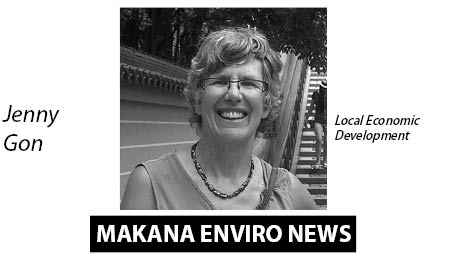A BIOGRAPHY OF THE KOWIE RIVER
As one of the founding members of the Kowie Catchment Campaign, I was delighted to
be able to attend the launch of Prof. Jacklyn Cock’s latest book ´Writing
the Ancestral River: A Biography of the Kowie’, this week. How privileged we are to have someone hold a mirror up to the natural, cultural and political history of this locally important catchment which is an integral part of our landscape, and has been so for millennia. Not that the book is a comfortable read. As noted in the press release about the book launch, the iQoyi runs through a formative meeting ground of people who have shaped our country’s history. And Cock, prompted by her personal historical connections to this
landscape, traces the history of the iQoyi, raising questions about colonialism,
capitalism, ‘development’ (including the Port Alfred marina) and ecology, and asking
us to consider the connections between social and environmental injustice. It’s a must-read for those who want to ensure the survival of the river and of our souls.
IAPS ON THE SOUTHERN COMMONAGE
Don Hendry, an environmentally concerned dog-walker, notes that users of the paths on the Southern Commonage above Grey Dam cannot fail to have noticed the alarming
increase in infestation of invasive alien plants (IAPs), taking hold in areas previously
cleared by Albany Working for Water, various environmental groups and by sponsored
Interactors (“junior Rotarians”) from local schools. Left unattended, these infestations of mainly black wattle (Acacia mearnsii) and long-leaved wattle (Acacia longifolia) will again take over large tracts of the commonage, an important constituent of the Oldenburgia Conservancy. The good news is that Albany WfW is back in action this month, and the Southern Commonage is on their list of areas to be cleared. In the meantime, however, Don is appealing to all users of the conservancy to uproot any IAPs they see. Larger organisations could organise groups of interested people to remove IAPs in a coordinated way, using tree poppers for larger saplings. Avoid slashing, as it often results in re-shooting – unless done at ground level. You can borrow tree poppers from WESSA, via the RU Botany Department [contact: Barry Hartley, 046 603 8597].
WHEN LOCAL IS NOT SO LEKKER
For many local nature lovers, the Great Fish River Reserve is one of the best-kept
secrets of the Eastern Cape. The reserve is a favourite haunt for lovers of the
Eastern Cape bush and the fauna that it supports. Within easy reach from
Grahamstown, the reserve gates are a 40-minute drive on the R67 to Fort
Beaufort. However, loyal supporters of the reserve are shocked at ECPTA’s latest tariff
increases for a game drive visit – at R90 or R115 pp, depending on the timing of the
visit, plus a conservation fee of R22 pp a day trip for two adults now costs either R224 or
R274 (half-price for kids). We would like to ask ECPTA to consider a stepped tariff, a la
SANParks, that will make the reserve more affordable to its local supporters. More info,
phone the GFRR Office at 087 286 6545.
TRASH ISLES CAMPAIGN
The anti-single-use-plastics campaign is gaining momentum, and so it should. As you
read this, a rubbish truck full of plastic is making its way into the oceans every minute.
There is now so much plastic garbage that an area cumulatively the size of France has formed in the
Pacific Ocean off the coast of Hawaii. In an innovative global anti-plastics initiative,
LADbible has teamed up with the Plastic Oceans Foundation to take this country-sized
trash patch and turn it into the world’s 196th nation – named the Trash Isles. Once they
met the criteria to become a country (their currency is ‘Debris’), they started recruiting
citizens online, and on World Oceans Day (8 June) they submitted a Declaration of
Independence to the United Nations to seek recognition of the Trash Isles as an official
country. In part due to the campaign’s success, the issue has become a major
discussion point around the world, with 193 countries at the most recent UN conference
pledging to tackle the global crisis of plastic in the oceans. The campaign recently won
two prestigious Grand Prix awards at the Cannes Lions Festival. For a two-minute video
clip go to https://youtu.be/u9Ne9VnZ7fs
Find us Online: www.grocotts.co.za/category/outside/enviro-news
Contacts for Makana Enviro-News:
Nikki Köhly: n.kohly@ru.ac.za, 046 603 7205 | Tim Bull: timothybull05@aol.com, 076 289 5122 |
Jenny Gon: j-gon@intekom.co.za, 046 622 5822 | Philip Machanick: p.machanick@ru.ac.za, 046
603 8635.


